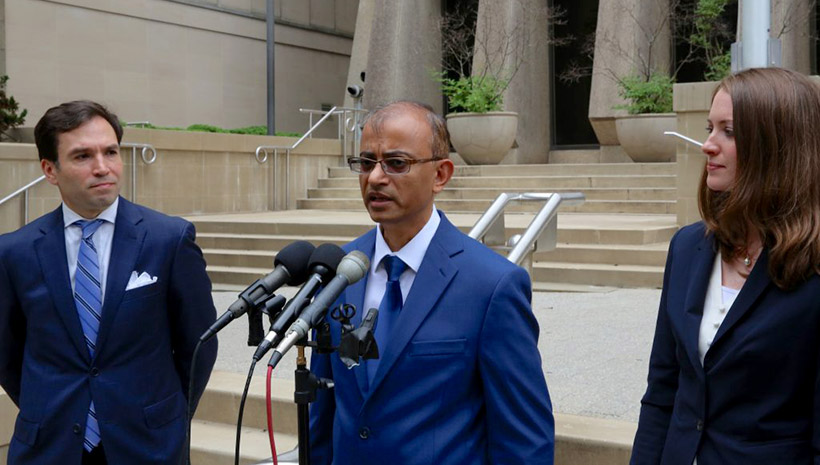Publisher's note: This post appears here courtesy of the Carolina Journal, and written by Julie Havlak.
At a July 31, 2018, press conference, Dr. Gajendra Singh, a Forsyth County surgeon, discusses the lawsuit he has filed challenging certificate of need laws. At left is Raleigh attorney H. Denton Worrell and at right is Institute for Justice Attorney Renee Flaherty. | Photo: Don Carrington/Carolina Journal
A doctor suing to overturn restrictions on patient care just won his first victory.
Special Superior Court Judge Gregory McGuire on Wednesday, Nov. 20, rejected the state's request to throw out
Dr. Gajendra Singh's case, allowing Singh to continue fighting the Certificate of Need regime as unconstitutional and monopolistic.
None of Singh's patients can get an MRI - one of the most expensive medical scans - because Singh can't buy an MRI machine without state permission under CON laws.
The federal government first pushed CON hoping to protect patients from over treatment by restricting providers' ability to treat patients.
North Carolina had to pass CON legislation twice before the N.C. Supreme Court let it stand. The Supreme Court sunk the first iteration of CON laws for "establishing a monopoly" in 1973. The federal government has since abandoned CON laws, but the legislation continues to restrict care in North Carolina.
Singh's fight for his imaging center began when he saw his patients grapple with opaque health care pricing. Singh would try to give people affordable care, he says, only to see them hit with enormous medical imaging bills.
And when Singh needed an ultrasound himself, the local hospital's outpatient department told him it would cost him about $1,200.
"That is too much money, so I grabbed my prescription, said 'thank you,' and just walked out of there," Singh said.
"That's what pushed me over the edge."
He decided to open his own imagining clinic, with prices listed up front. His patients come from hours away, driving to his Winston-Salem imaging center from Virginia, Tennessee, and South Carolina.
Statesville resident Karen Bolick said she saved roughly $2,000 on her MRI by making a 50-mile drive to Singh's clinic over a year ago.
"It was much cheaper," Bolick said.
"I had to get it, because I wanted to know where the pain was coming from. ... It was worth the drive, for sure."
She was one of the few who was able to get an MRI with Singh. He could not continue giving patients MRI scans for $500 to $700. Each scan was too costly for the imaging center.
Running a rented MRI machine for a full week would cost Singh $1 million - roughly the price of a used machine.
"That's just an insane amount of money, and that defeats the purpose of helping out people," Singh said.
"To make a million dollars, charging only $500 a scan - imagine how many scans I would have to do."
Eventually, Singh couldn't afford to rent the MRI machine, but he couldn't afford to buy one, either. Applying for CON permission can cost $500,000, and he would have to poach the CON for an MRI from larger health systems. The application system gives incumbents multiple opportunities to challenge CON applications, and fights over certifications can drag on for years.
"A small, independent provider of low-cost medical services cannot afford to spend $500,000 competing with large, well-heeled health care conglomerates," Jon Guze, John Locke Foundation director of legal studies, wrote in an amicus brief supporting the doctor's case.
Singh's lawyers argue landing new CON permissions for an MRI machine is the exception, not the rule. The state has denied the need for new MRI machines in the majority of the state's counties since 1993, when MRI machines joined CON laws, said Institute of Justice attorney Joshua Windham, who represents Singh.
"The tragedy of this case is that Dr. Singh knows real people who need the scans he wants to provide," Windham said.
"Yet the state has told him that those services aren't allowed because they aren't needed. You now have bureaucratic pencil-pushers and their calculators determining need over the experiences of real people."
Windham fears the state will file more procedural motions to keep the case in limbo, delaying any resolution over CON laws.
"Perhaps the biggest legal barrier that we face is that courts just don't like considering the constitutionality of economic regulation. They don't think it is their job," Windham said.
"But the courts are the ones charged with enforcing constitutional limits on what the legislature can and can't do to doctors and patients."
It could be years before the N.C. Supreme Court decides again, said Guze.
The N.C. Healthcare Association failed to respond to requests for comment.

